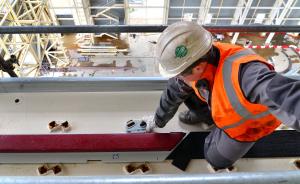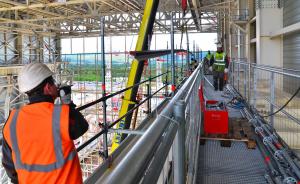Laying tracks for the elevated railway
They're as thick and strong as railroad tracks and could easily carry the equivalent of four TGVs, two Eurostars or 15 steam locomotives. The steel rails that are being installed 43 metres above the basemat of the Assembly Hall are an essential part of the lifting system that will handle components weighing up to 1,500 tonnes.
When rails are laid on the ground, they rest on a bed of crushed stone (the track ballast) that distributes the load of the passing trains. In the ITER Assembly Hall, the ballast role is played by massive steel elements (9.3 metres long, 20 tonnes) called railway beams.
On Thursday 12 May, on the north side of the Assembly Hall, the first 18-metre length of rail was lifted, carefully deposited and fastened with heavy clips to the ledge formed by the railway beams. It will take a few weeks to install the rails and fine tune their alignment in time for the installation, beginning next month, of the girders and trolleys of the travelling crane.



